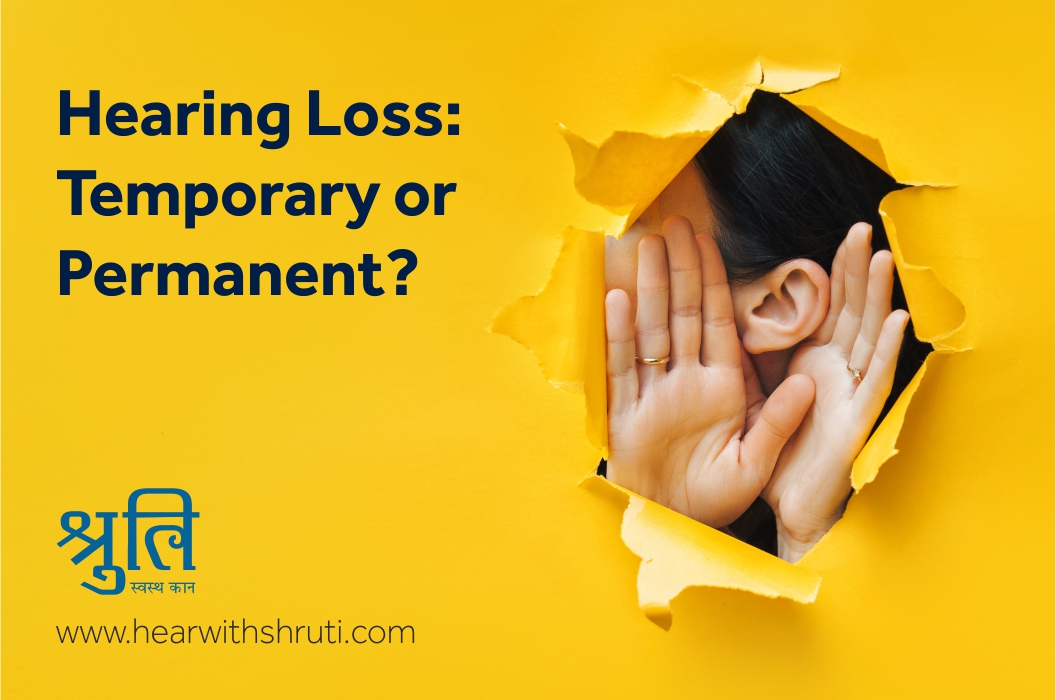Hearing Loss: Temporary or Permanent?

While many causes of hearing loss are temporary, if you do not seek treatment promptly, complications can arise that lead to a permanent loss of hearing.
Sudden hearing loss? Take action
If you have developed rapid and sudden hearing loss in one or both ears and you can not rule out any obvious causes listed below. Get medical help right away. Without treatment, this hearing loss can become permanent. Here is a checklist to help you know if you should seek prompt medical treatment but always contact your medical provider for guidance.
- Were you very recently exposed to several hours of loud noise? (such as a live concert, target shooting or industrial machinery)
- Have you recently had a cold or ear infection?
- Did you recently exercise very strenuously?
- you been under extreme stress?
Common causes of temporary hearing loss
Ear infection: Ear infections can cause a conductive hearing loss. Infection in the middle ear can cause a build-up of fluid, obstructing the movement of the eardrum and the small bones attached to it. This is most common in children, but it can occur at any age. Ear infections will typically fix themselves, it’s never a bad idea to see your doctor just in case you are in need of antibiotics.
Excessive earwax: Though earwax or cerumen, will usually fall out of your ears on its own or with soft washing, it can sometimes build up and block the ear canal. This can cause an array of issues ranging from tinnitus to hearing loss. If the wax is not easily removed from gently washing with a warm washcloth, consult your hearing care professional. You should never try to remove your ear wax with a sharp object including cotton swabs, these can push the wax deeper into your canal or even worse perforate your eardrum and cause permeate damage.
Loud Noise: Exposure to loud noise damages the sensory and hearing organs. The intensity and duration of the loud noise will impact the damage it has on hearing loss.
Strenuous exercise: When you exercise beyond your fitness level, you may experience temporary hearing loss. While hearing typically returns to normal in a few hours, see your doctor if the symptoms persist.
Stress: Stress can cause so many issues that people often attribute to something else. Did you know that anxiety and stress can cause tinnitus, or ringing in the ears? This is known to seriously affect people’s ability to hear.
Best ENT Doctors for Hearing Loss in Lucknow | Best ENT Doctor & Specialist in Jaipur | Top Hearing Care Clinics in Jamnagar | Best Hearing Care Clinics in Junagadh | Hearing Aid Clinics for Hearing Loss in Rajkot
Common causes of permanent hearing loss
Prolonged exposure to excessive noise: While a single loud blast may temporarily worsen your hearing, repeated exposures to blasts or other loud noises can lead to permanent hearing loss. In fact, this the most common form of sensorineural hearing loss, which is permanent. Sensorineural refers to the ears nerves and tiny sensory cells that are easily damaged.
Age related hearing loss: The effects of ageing are numerous. Age-related hearing loss is called presbyacusis and affects the majority of those over 60 years of age and certainly those over 70 years. It’s the most common cause of hearing loss.
Health conditions: Quite a few health conditions can cause permanent hearing loss, such as genetic disorders, autoimmune conditions like Meniere disease, viral infections such as mumps, and head trauma. There are even medications that cause hearing loss.
If you suspect any degree of hearing loss, we recommend you see a doctor or hearing care professional. Shruti Hearing Loss Clinics can determine if your hearing loss is temporary or permanent and recommend the best course of treatment based on your specific information.
For more information or if feel you may have trouble hearing take our online hearing test. Or reach out to one of our highly trained hearing health care professionals today.
